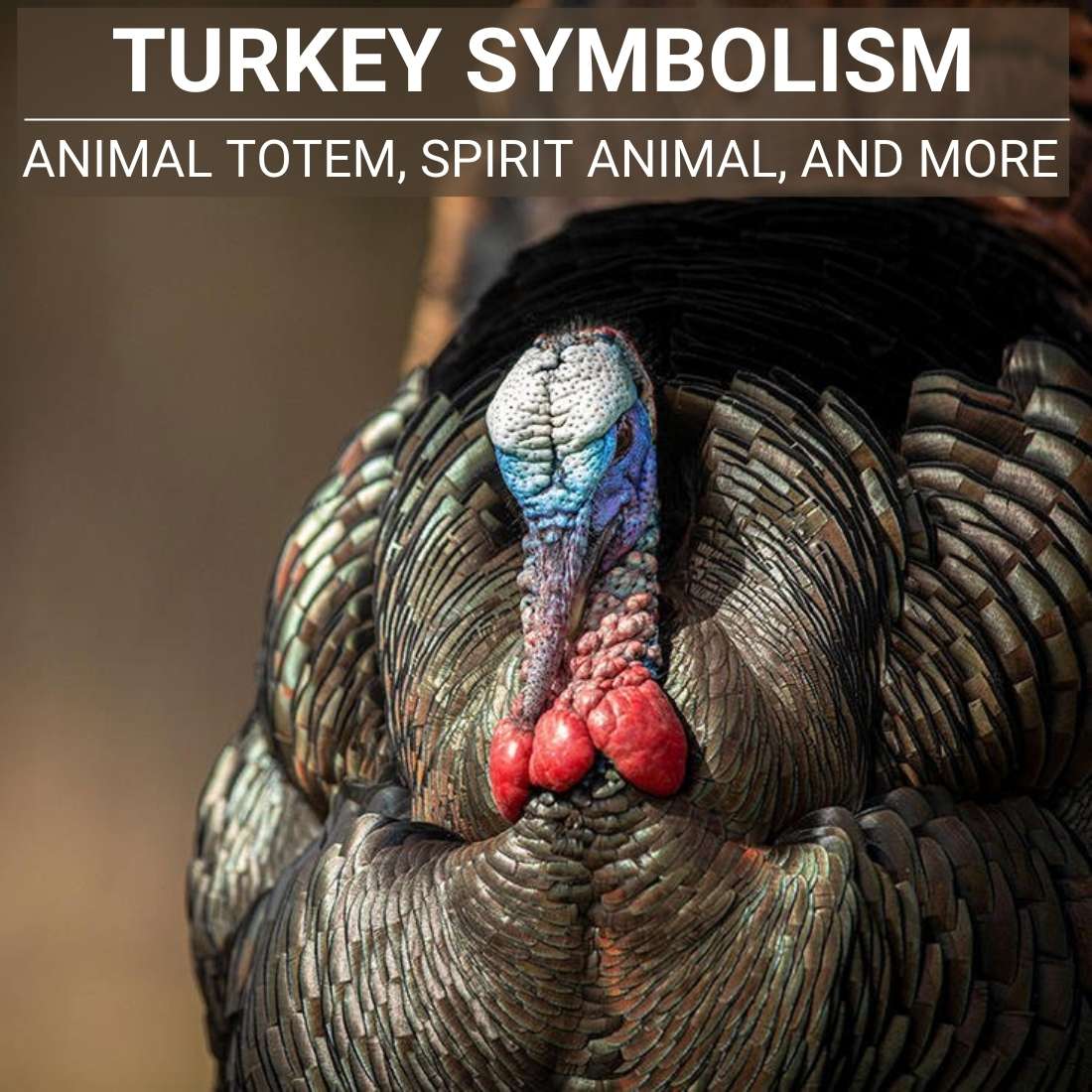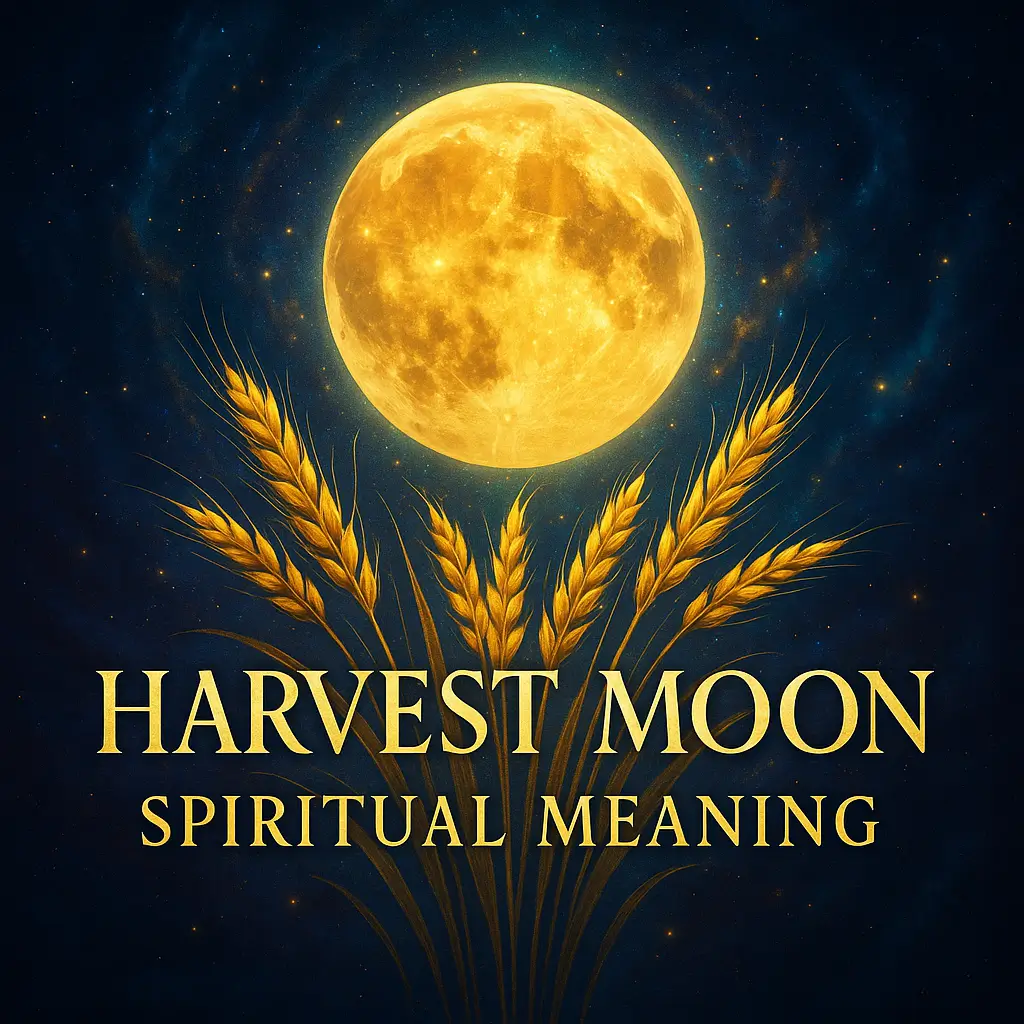Table of Contents
- 1 Key Takeaways
- 2 Turkey Symbolism: A Deep Dive
- 3 Turkey totem
- 4 The History of Turkey Symbolism
- 5 Dreaming of Turkeys: What Does It Mean?
- 6 Exploring Turkey as a Spiritual Messenger and Symbolic Guide
- 7 Conclusion
- 8 FAQs
- 8.1 What is Turkey Symbolism?
- 8.2 What does a turkey symbolize in Native American culture?
- 8.3 What does it mean to dream about a turkey?
- 8.4 What does turkey symbolize in Christian culture?
- 8.5 What is the meaning behind seeing turkeys in nature?
- 8.6 How do I know if turkey is my spirit animal?
- 8.7 What symbolism does a turkey represent in dreams?
- 8.8 What is the spiritual significance of finding turkey feathers?
- 8.9 How does turkey symbolism differ across cultures?
- 8.10 What habits of turkeys contribute to their symbolic meaning?
- 8.11 How can I work with turkey animal totem energy?
Key Takeaways
- Turkey symbolism represents abundance and fertility across many cultures, particularly in Native American traditions where it’s associated with Mother Earth.
- As a spirit animal, turkeys teach us about adaptability, staying grounded, and expressing emotions authentically despite their ability to fly.
- Turkeys symbolize protection and guardianship in many traditions, including the Navajo culture where they’re seen as protectors of home and family.
- Dreaming about turkeys often indicates prosperity and gratitude, though specific interpretations vary depending on the dream’s context.
- The historical significance of turkeys spans from Mesoamerican civilizations through the Pilgrims’ first harvest, consistently representing generosity and new beginnings.
Have you ever wondered why turkey, a bird often associated with Thanksgiving feasts, holds such a profound place in various cultures? The symbolism of turkey is rich and diverse, spanning from Native American traditions to modern-day interpretations.
In this article, we delve into the fascinating world of turkey symbolism, revealing insights that might just change the way you look at this bird. From its role as a symbol of abundance and fertility to its significance as a spirit animal, turkey’s symbolism is as intriguing as it is diverse.
Stay with us as we unravel the hidden meanings behind this seemingly ordinary bird.
“The turkey’s eyes are such that he can see a bumblebee turn a somersault on the verge of the horizon.”
~ Archibald Rutledge
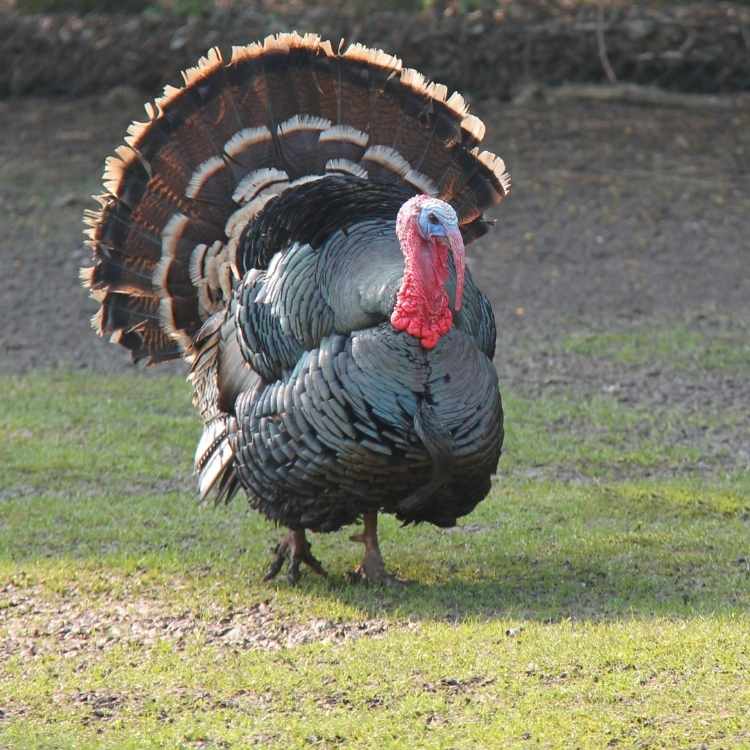
Turkey Symbolism: A Deep Dive
Turkey is a bird that holds profound spiritual significance across many cultures. Its history dates back to 500 B.C., when it was first domesticated in Mesoamerica.
Known for their natural generosity, turkeys have long served as a source of meat and feathers, used for clothing, personal adornment, and in religious ceremonies. They are symbols of gratitude, abundance, and generosity.
Adaptability and Flexibility
Turkeys are adaptable birds, capable of thriving in a variety of habitats. This adaptability inspires us to weather life’s storms and thrive under any conditions. Turkeys are also flexible, particularly in their direction, a quality we can emulate in our life paths.
Prosperity and Abundance
Turkeys have been a food source for centuries, symbolizing abundance where there is food. Serving turkey represents hospitality and gratitude for the sustenance provided by a higher being. It represents the cycle of birth, death, and rebirth that all creatures experience.
Family and Friendship
A turkey on the table symbolizes the coming together of friends and family. Like turkeys, we need a flock to survive, to find people who understand us on a deeper level. If you’ve been feeling alone, it may be time to open up to the significant people in your life.
Protection
Turkeys, with their large size and protective feathers, symbolize protection. Many cultures, including the Navajo, see turkeys as guardians of the home and family. This symbolizes that you are protected by your ancestors and should have confidence in achieving your goals.
Fatherhood and Fertility
Turkeys are seen as a good omen in many cultures, symbolizing fertility due to their year-round egg-laying and the male turkey’s mating ritual. In some cultures, turkey feathers are worn as symbols of fertility.
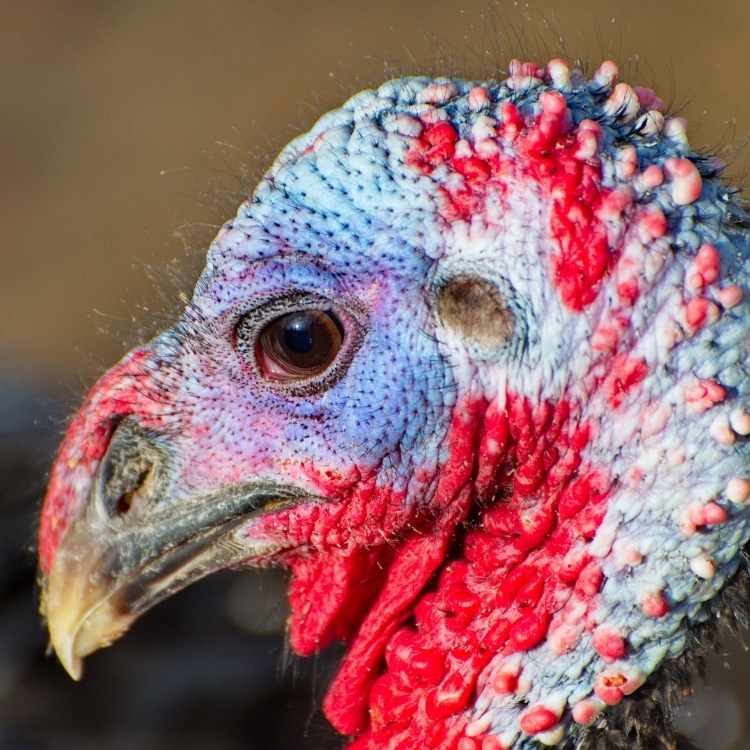
Turkey totem
The color of a turkey’s head changes boldly while expressing its emotions. As totems, they are a gentle nudge that we should not suppress our feelings to conform to the standards of society.
Be different and bold with your emotions and express them without fear of being judged. Staying on the ground in spite of their ability to fly reminds us to be humble and stay grounded no matter how far we reach in life.
Their wings are agile and huge, to show a message that flexibility should be embodied as life continuously redirects us to a path that would serve us.
The History of Turkey Symbolism
Turkey holds a significant place in the annals of history, particularly in Native American culture and Mesoamerican history.
Turkey in Native American Culture
In Native American culture, turkey was revered as a symbol of abundance and fertility. The bird was seen as a gift from the Earth, providing food and feathers for ceremonies and clothing.
Turkey’s generous nature was a lesson for the tribes, teaching them the importance of sharing and giving.
Turkey in Mesoamerican History
Moving further south to Mesoamerica, turkey continued to hold symbolic importance. The ancient Maya, Aztec, and other Mesoamerican civilizations domesticated turkeys for their meat and feathers.
They were considered sacred animals, often appearing in religious rituals and artwork.
Turkey and the Pilgrims’ First Harvest
Fast forward to the arrival of the Pilgrims in the New World, turkey again took center stage. The bird was a crucial part of the Pilgrims’ first harvest, which we now celebrate as Thanksgiving.
Turkey became a symbol of a successful harvest and the beginning of a New Year. Discover more about this in Turkey Feathers History – The Wandering Bull, LLC.
From the tribal societies of North America to the advanced civilizations of Mesoamerica, and finally to the early settlers of the New World, turkey has been a constant symbol of abundance, fertility, and new beginnings.
Turkey and Jewish Tradition
Turkey wasn’t covered in the Bible, but it’s still a well-known bird. The Jews didn’t know about this native American animal until they were brought back from Europe during exploration times and even later on when Turkey was introduced to them by other countries like Portugal or Spain.
In modern Jewish culture, turkey is often served during festive meals, symbolizing abundance and celebration.
Turkey Cultural Symbolism Comparison
| Culture | Symbolism of Turkey | Additional Information |
|---|---|---|
| Native American | Abundance, Fertility | Associated with Mother Earth and changing seasons |
| Mexican | Good Luck | Often given as a gift during holidays |
| Chinese | Honesty, Integrity, Good News, Luck | Considered a bringer of good news and luck |
| Christian | Gluttony, Greed, Thanksgiving, Harvest | Associated with Thanksgiving and the harvest |
| Dream Interpretation | Abundance, Prosperity, Gratitude | Specific meaning can vary depending on the context of the dream |
| Mesoamerican | Sacred Animal | Used in religious rituals and artwork |
| Pilgrims’ First Harvest | Successful Harvest, New Year | Symbol of a successful harvest and the beginning of a New Year |
Dreaming of Turkeys: What Does It Mean?
Dreams are a fascinating realm where our subconscious communicates with us using symbols and scenarios. One such symbol that might appear in your dreams is turkey.
Symbolism of Dreaming About a Turkey
Dreaming about a turkey often carries positive connotations. It could symbolize abundance, prosperity, or gratitude. If a turkey appears in your dream, it might be a sign that you are about to experience a period of growth and abundance in your life.
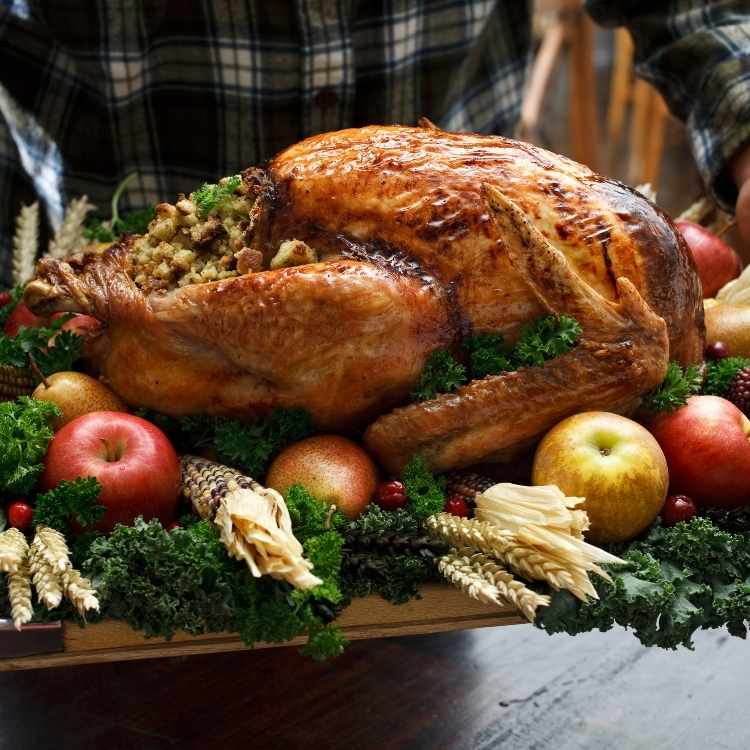
Killing a Turkey in a Dream
On the other hand, if you dream of killing a turkey, it might signify that you are trying to gain something at the expense of others. It could also mean that you are trying to force your ideas on others. This dream could be a wake-up call to reassess your actions and attitudes.
Seeing a Dead Turkey in a Dream
Seeing a dead turkey in a dream might symbolize the end of a prosperous period or a warning of potential loss. It could also represent feelings of guilt or regret.
It’s important to remember that dream interpretation is subjective and depends on your personal circumstances.
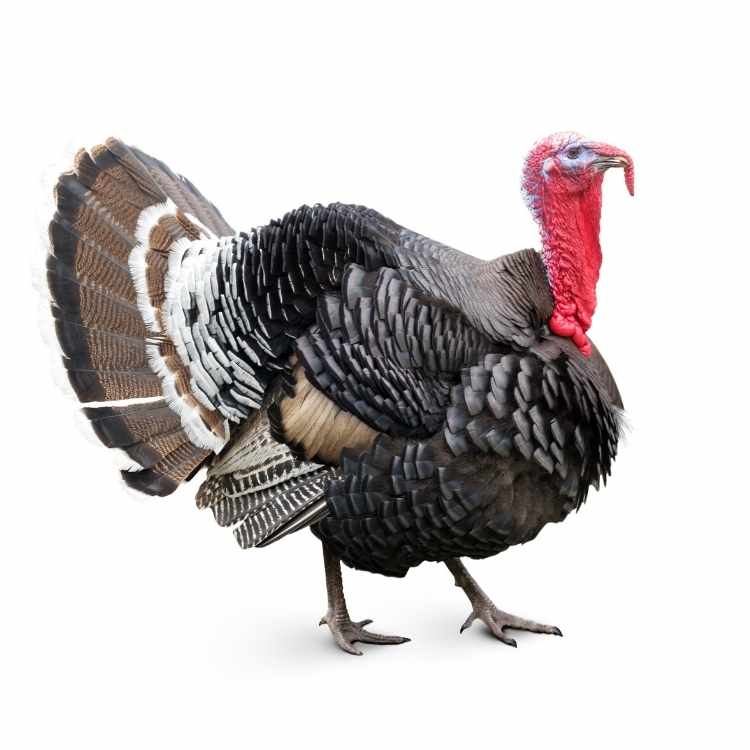
Exploring Turkey as a Spiritual Messenger and Symbolic Guide
Beyond its place at the dinner table, the turkey carries profound symbolic significance across spiritual traditions and cultural practices. As a spirit animal, turkey embodies remarkable wisdom and guidance for those attuned to its presence. When seeing turkeys in nature or in dreams, many interpret this as a spiritual meaning that encourages generosity and community awareness.
Turkey as a Spiritual Guide: Messages from the Wild
What does it mean when you repeatedly encounter turkeys in your life? Many spiritual practitioners believe that turkey animal symbols appear when we need reminders about sharing our unique gifts. The turkey spiritual meaning often points to selfless giving – just as turkeys provide sustenance through their meat and feathers. Their distinctive habits of foraging collectively and maintaining strong social bonds reinforce this symbolic message of community support and shared abundance.
Those who recognize turkey symbolism spirituality in their lives may be receiving guidance about embracing community leadership roles or developing greater spiritual awareness. The turkey totem teaches us to honor the earth while remaining connected to higher spiritual realms – a beautiful balance between groundedness and spiritual elevation.
The Sacred Language of Turkey Feathers
Have you ever wondered what do turkey feathers symbolize? Finding a turkey feather isn’t merely coincidental in many spiritual traditions. The turkey feather spiritual meaning often relates to honor, connection with earth energies, and spiritual protection. Indigenous cultures have long incorporated these feathers into ceremonial practices, recognizing their power to facilitate communication between earthly and spiritual realms.
For those asking what does a turkey mean spiritually, the answer often involves themes of sacrifice, community nurturing, and earth-based wisdom. During Thanksgiving celebrations, the tradition of carving up the turkey symbolizes not just nourishment but also the spiritual practices of gratitude and shared abundance. Understanding what does turkey symbolize on Thanksgiving connects us to deeper traditions of harvest celebration and community bonds that transcend mere feasting.
As we deepen our understanding of turkey’s symbolic importance, we recognize this magnificent bird as more than holiday fare – it’s a spiritual messenger guiding us toward generosity, earth wisdom, and authentic community engagement. When the turkey animal spirit crosses your path, consider what messages about abundance and giving it might be bringing into your life.
Top 10 Appearances of Turkeys in Arts and Literature
More than just a holiday icon, the turkey has strutted into various corners of culture—as a symbol of gratitude, satire, or even national pride. From political essays to children’s books, here are ten notable appearances of turkeys in the creative world:
| Title / Work | Author / Artist | Year |
|---|---|---|
| A Turkey for Thanksgiving (Children’s Book) | Eve Bunting | 1991 |
| Benjamin Franklin’s Turkey Letter | Benjamin Franklin | 1784 |
| Turkey Trouble (Children’s Book) | Wendi Silvano | 2009 |
| The Turkey Who Forgot How to Gobble | Rhonda Fischer | 2003 |
| Turkey in the Straw (Folk Song) | American Folk Origin | 19th c. |
| Pardon That Turkey (Illustrated Book) | Susan Sloate | 2003 |
| The Turkey Season (Short Story) | Alice Munro | 1996 |
| Gobble Gobble (Painting Series) | Folk Artists (US) | Various |
| The Turkey Prince (Satirical Essay) | American Humorists | 20th c. |
| Thanksgiving at the Tappletons’ (Book) | Eileen Spinelli | 1982 |
Conclusion
The symbolism surrounding this remarkable bird is a captivating tapestry intertwined with time and diverse cultures, portraying it as a representation of abundance, fertility, generosity, and protection. From its revered role in Native American culture and Mesoamerican history to its symbolic connection to the first Thanksgiving, this creature embodies themes of prosperity, family, and new beginnings.
Across various cultures and dream interpretations, it continues to hold positive connotations, signifying growth, gratitude, and adaptability. As we unravel the concealed meanings behind this seemingly ordinary avian, we gain a deeper appreciation for its profound and varied symbolism in our world.
Whether serving as a spirit animal, a symbol of good fortune, or a representation of cherished family gatherings, this creature’s significance serves as a poignant reminder of the interconnectedness between nature and humanity.
The next time we encounter this bird, let us pause and reflect on the rich symbolism it carries, allowing us to discover a newfound admiration for this exceptional winged creature.
FAQs
What is Turkey Symbolism?
Turkey symbolism is the interpretation of turkeys’ characteristics and behaviors across various cultures. It often represents generosity, adaptability, prosperity, family, and friendship.
What does a turkey symbolize in Native American culture?
In Native American culture, turkey symbolizes abundance and fertility. It’s associated with Mother Earth and the changing of the seasons.
What does it mean to dream about a turkey?
Dreaming about a turkey often symbolizes abundance, prosperity, or gratitude. However, the specific meaning can vary depending on the context of the dream.
What does turkey symbolize in Christian culture?
In Christian culture, turkey is often seen as a symbol of gluttony and greed. It’s also associated with Thanksgiving and the harvest.
What is the meaning behind seeing turkeys in nature?
Encountering turkeys in nature often signifies an invitation to reconnect with earth energies and community values. These sightings may suggest it’s time to ground yourself, share your gifts generously with others, and embrace a more community-oriented approach to life’s challenges.
How do I know if turkey is my spirit animal?
You may have turkey as your spirit animal if you feel drawn to its energy, frequently encounter turkeys in dreams or reality, resonate with qualities of generosity and community, and find yourself balancing practical needs with spiritual awareness. Turkey people often have natural nurturing abilities.
What symbolism does a turkey represent in dreams?
In dreams, turkeys typically symbolize forthcoming abundance, community celebration, or a reminder to practice gratitude. If the turkey appears vibrant and healthy, it suggests prosperity ahead. A distressed turkey might indicate concerns about providing for others or community responsibilities.
What is the spiritual significance of finding turkey feathers?
Finding turkey feathers often represents a spiritual blessing of abundance and connection to earth wisdom. The feathers serve as reminders to stay grounded while pursuing spiritual growth. Many traditions consider them protective talismans that facilitate communication between earthly and spiritual realms.
How does turkey symbolism differ across cultures?
Turkey symbolism varies globally, with Native American traditions viewing it as sacred and connected to Mother Earth. In European folklore, turkeys represent pride and sacrifice. Mesoamerican cultures honored turkeys as magical beings, while modern Western interpretations often focus on themes of abundance and gratitude.
What habits of turkeys contribute to their symbolic meaning?
Turkeys’ communal foraging, strong family bonds, and daily dust-bathing rituals reflect their symbolic connection to earth energies. Their ability to fly despite their size represents transcendence, while their distinctive gobbling demonstrates authentic self-expression—qualities that enhance their spiritual significance across traditions.
How can I work with turkey animal totem energy?
To connect with turkey totem energy, practice daily gratitude rituals, engage in community service, create shared meals, and spend time in nature. Meditate on balancing practicality with spirituality. Consider keeping ethically sourced turkey feathers as spiritual tools for grounding and protection work.
